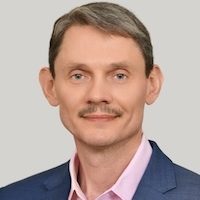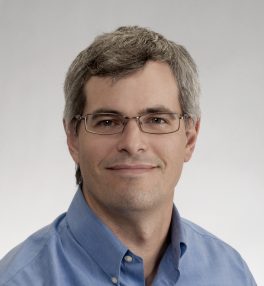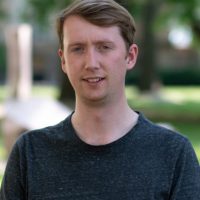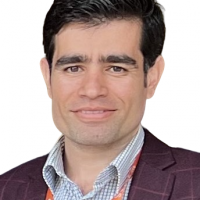 |
Andrey Bakulin
Research Professor
Andrey Bakulin is a research professor at the Bureau of Economic Geology, where he co-leads the Texas Consortium for Computational Seismology alongside Professor Sergey Fomel. He focuses his research on advancing seismic monitoring technologies and instrumentation, with an emphasis on land seismic techniques.
His work supports both conventional energy exploration and emerging fields in the energy transition. He also leads the H2 injection field test at the Devine site, spearheaded by the GeoH2 consortium. Bakulin’s development of the virtual source method revolutionized seismic monitoring by transforming downhole receivers into virtual sources, significantly improving velocity estimation and imaging. His leadership in 4D seismic monitoring, particularly in the use of shallow buried receivers for sensitive subsurface monitoring, has set new standards. He has been selected as a Society of Exploration Geophysicists (SEG) distinguished lecturer, receiving two SEG Best Paper awards, and earning numerous other industry accolades. He was the 2023 recipient of the Reginald Fessenden Award. |
 |
Jani Das Research
Assistant Professor
Jani Das joined the Bureau of Economic Geology in May. She is currently working with Michael Young, the Jackson School of Geosciences’ associate dean of research, on a life cycle analysis that is comparing different electricity options. She is also involved in electricity grid dispatch modeling and related studies. Das holds a doctoral degree in energy science and engineering from the Indian Institute of Technology, Bombay, India, and a master’s degree in electrical engineering from the National Institute of Technology Calicut, India. Prior to joining the bureau, she was dean of the research and consultancy cell, head of the department, and associate professor in the Department of Electrical and Electronics Engineering at Muthoot Institute of Technology and Science, in Kerala, India. She was also a part of the collaborative project “Intelligent Microgrids with Appropriate Storage of Energy” at IIT Bombay and the University of Nottingham. Since 2024, she has been a senior member of the Institute of Electrical and Electronics Engineers.
|
 |
Xuesong Ding
Research Assistant Professor
Xuesong Ding joined the Bureau of Economic Geology in March 2023. Her research focuses on landscape and basin evolution modeling at various spatial and temporal scales. She also works on salt tectonic modeling by coupling thermomechanical and surface processes. Before joining The University of Texas at Austin, Ding earned a doctoral degree at the University of Sydney, Australia, and then worked as a postdoctoral fellow at the University of California, Los Angeles, where she researched linking lithospheric dynamics and surface topography to basin evolution. |
 |
Brent Elliott
Research Associate Professor
Brent A. Elliott is an economic geologist, associate research professor and professional geoscientist who has been involved in mining and exploration-related research for the past 25 years. Elliott previously worked at the Bureau of Economic Geology from August 2012 to February 2020. He returned after serving as the director of surface mining at the state’s energy regulatory agency. His professional background and research include a wide variety of mined commodities, including geochemical modeling of all types of resources and metallic deposits, geospatial tools for predictive mapping and exploration, industrial sand, aggregate and stone materials, coal, uranium, critical minerals (especially lithium) in produced water and brines, rare earth element occurrences and other critical elements, novel approaches to exploration, mineral extraction methods, characterization, assessment, inventory and valuation of mineral resources. |
 |
Sophia Gong
Research Assistant Professor
Sophia Gong joined the Bureau of Economic Geology in March 2024. Her research focuses on fracture propagation and reservoir simulation of unconventional reservoirs, decline curve analysis, and basin-scale productivity driver analysis using machine learning approaches. Prior to joining the bureau, she worked as a petroleum engineer at an oil service firm in Houston for three years. Her previous work experience involved unconventional reservoir completion design and optimization, and integrated simulation workflow (fracture and reservoir simulation) of unconventional reservoirs. Gong holds a doctoral degree in chemical engineering from The Ohio State University and a master’s degree in petroleum engineering from The University of Oklahoma. |
 |
Anna Ruth Halberstadt
Assistant Professor
Anna Ruth “Ruthie” Halberstadt joined the Jackson School of Geosciences in fall 2024 as an assistant professor in the Department of Earth and Planetary Sciences. Halberstadt is a glaciologist. She studies Antarctica’s warm periods and how this history can provide insights about future ice sheet changes as the climate continues to change. Halberstadt’s niche is that she uses both geologic data and climate and ice sheet modeling in her research. She earned a doctoral degree from the University of Massachusetts Amherst and was previously a postdoctoral research associate at the Berkeley Geochronology Center at the University of California, Berkeley. |
 |
Zhe Jia
Research Assistant Professor
Zhe Jia joined the University of Texas Institute for Geophysics as a research assistant professor. Among Jia’s research achievements, he discovered that many earthquakes happen as a series of rapid jolts along connected faults. Jia published an analysis in Science of the 2023 Turkey-Syria earthquakes. He also discovered that a mysterious 2022 tsunami was set off by a previously undetected earthquake in the South Atlantic. Jia’s current projects include an investigation of deep earthquakes, an effort to map unknown faults, and a new exploration of Chile’s earthquakes. Jia earned a doctorate in geophysics from the California Institute of Technology. Prior to joining UTIG, Jia was the Green Postdoctoral Scholar at Scripps Institution of Oceanography. |
 |
Marek Locmelis
Associate Professor
In August 2024, Marek Locmelis joined both the Bureau of Economic Geology and the Department of Earth and Planetary Sciences as an associate professor. He specializes in critical minerals that are important for the energy transition, such as nickel, cobalt and the rare earth elements, as well as sustainable and ethical approaches to mining. Currently, he is most interested in what is known as “conceptual exploration targeting” for critical minerals. He studies what geologic key ingredients had to come together in space and time to form critical mineral deposits. Locmelis has been teaching and conducting economic geology research for eight years, most recently at the Missouri University of Science and Technology. He earned a doctoral degree in earth and planetary sciences from Macquarie University in Sydney, Australia. |
 |
Shujuan Mao
Assistant Professor
Shujuan Mao joined the Department of Earth and Planetary Sciences as an assistant professor in fall 2024. In her research, Mao uses passive seismic measurements to monitor environmental processes such as changes in groundwater and geothermal energy, and to research carbon capture and storage opportunities. This is an emerging area in seismology that Mao is hoping to apply to study groundwater in Austin and the surrounding areas. Mao earned a doctoral degree in geophysics from the Massachusetts Institute of Technology and was previously a postdoctoral researcher at CNRS at L’Institut des Sciences de la Terre in Grenoble, France. |
 |
Craig Martin
Assistant Professor
Craig Martin joined the Department of Earth and Planetary Sciences in fall 2023. His research focuses on plate tectonics, employing paleomagnetism, field-based structural geology and geochronology to answer questions about where Earth’s plates were tens of millions of years ago, and how they moved. Martin earned a doctoral degree from the Massachusetts Institute of Technology studying the collision history of the Western Himalayas. This research involved traveling to remote regions of northwest India, conducting geological mapping and collecting rock samples to analyze. |
 |
Abouzar Mirzaei Paiaman
Research Assistant Professor
Abouzar Mirzaei Paiaman’s research focuses on both fundamental and applied studies in energy production and storage and carbon management through reservoir simulation, mathematical modeling, laboratory experimentation, field research, and economic analysis. Before joining the Bureau of Economic Geology, he worked as a research associate at The University of Texas at Austin’s Hildebrand Department of Petroleum and Geosystems Engineering. Prior to that, he was a postdoctoral researcher at the Center for Energy and Petroleum Studies in Brazil. He holds a doctoral degree in petroleum engineering from Sharif University of Technology in Iran. Paiaman has held positions in both industry and academia, and he has published more than 60 scholarly articles. |
 |
Hailun Ni
Research Assistant Professor
Hailun Ni is part of the Gulf Coast Carbon Center at the Bureau of Economic Geology, where she was formerly a postdoctoral fellow. Her research focuses on the impact of geologic heterogeneity on plume migration and trapping in the geologic storage of carbon dioxide. She also manages the Sandtank Lab and uses laboratory experiments to better understand subsurface fluid flow. Prior to joining the bureau, Ni earned a doctoral degree in energy resources engineering from Stanford University. |
 |
C. Nur Schuba
Research Assistant Professor
Nur Schuba was previously a postdoctoral researcher for the State of Texas Advanced Resource Recovery (STARR) program at the Bureau of Economic Geology, which she joined in 2022. She now works for the same program as a research assistant professor and focuses on the characterization of bedded and domal salt formations for underground storage purposes. Schuba’s research includes salt deposition and tectonics, continental rifting processes such as detachment faulting and serpentinization, and geological storage of hydrogen. Outside of research, she is interested in science communication using illustration, especially for younger demographics. Prior to joining the bureau, Schuba worked as a visiting scientist for Yellowstone National Park and as a geoscientist for ExxonMobil, and she conducted measurements and logging as a drilling engineer for SLB, where she acquired and interpreted data to make sense of planet Earth. |
 |
James Thompson
Research Assistant Professor
James Thompson is a research assistant professor at the Bureau of Economic Geology. Previously, Thompson was a postdoctoral fellow at Baylor University and the University of Pittsburgh. Thompson earned a doctoral degree in remote sensing and volcanology from the University of Pittsburgh, focusing on the thermophysical evolution of propagating lava flows in Hawaii and Guatemala. His principal expertise focuses on developing novel remote sensing and geospatial techniques to understand thermodynamics of terrestrial processes across spatial and temporal scales and determine societal impacts. Currently, Thompson is leading an effort developing miniature thermal infrared (TIR) imaging systems for deployment on uncrewed aerial vehicles (UAV) to improve understanding of wildfire behavior in Texas. This effort advances the derivation of critical heat and gas flux rates in 3D (SO₂, CO₂, and NH₃) that influence wildland fire dynamics and the impacts of fires on ecosystems and air quality. |
 |
Justin Thompson
Research Assistant Professor
Justin Thompson joined the Bureau of Economic Geology as a research assistant professor in August 2023. He was previously a postdoctoral fellow and a graduate research assistant. His research interests are in water resource management and planning: a nexus of hydrology, policy and economics. He is passionate about applying the latest scientific data and approaches to address key economic and policy challenges for water resources, particularly groundwater. He recently developed a new method for quantifying the hydro-economic impacts of changes in groundwater levels and led a pilot program to test those methods with a cohort of Texas groundwater management entities. Thompson brings a multifaceted perspective to his research, having been an international project finance professional, manager of a wastewater utility, a paralegal, and a technical volunteer with a nonprofit bringing ground and rainwater solutions to underserved communities in East Africa.
|